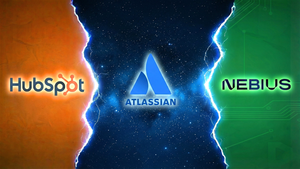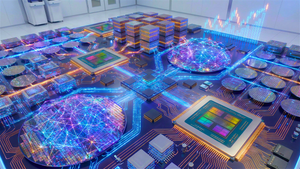
London, UK – October 2, 2025 – In a monumental stride for biotechnology and medicine, generative artificial intelligence (AI) has achieved a scientific breakthrough, demonstrating an unprecedented ability to design synthetic proteins for genome editing that not only match but significantly outperform their naturally occurring counterparts. This pivotal development, highlighted by recent research, signals a paradigm shift in genetic engineering, promising to unlock novel therapeutic avenues and accelerate the quest for precision medicine.
The core of this advancement lies in AI's capacity to create novel protein structures from scratch, bypassing the limitations of natural evolution. This means gene-editing tools can now be custom-designed with superior efficiency, precision, and expanded target ranges, offering unprecedented control over genetic modifications. The immediate significance is immense, providing enhanced capabilities for gene therapy, revolutionizing treatments for rare genetic diseases, advancing CAR-T cell therapies for cancer, and dramatically accelerating drug discovery pipelines.
The Dawn of De Novo Biological Design: A Technical Deep Dive
This groundbreaking achievement is rooted in sophisticated generative AI models, particularly Protein Large Language Models (pLLMs) and general Large Language Models (LLMs), trained on vast biological datasets. A landmark study by Integra Therapeutics, in collaboration with Pompeu Fabra University (UPF) and the Center for Genomic Regulation (CRG), showcased the design of hyperactive PiggyBac transposases. These enzymes, crucial for "cutting and pasting" DNA sequences, were engineered by AI to insert therapeutic genes into human cells with greater efficacy and an expanded target range than any natural variant, addressing long-standing challenges in gene therapy. The process involved extensive computational bioprospecting of over 31,000 eukaryotic genomes to discover 13,000 unknown transposase variants, which then served as training data for the pLLM to generate entirely novel, super-functional sequences.
Another significant development comes from Profluent Bio, which unveiled OpenCRISPR-1, the world's first open-source, AI-designed CRISPR editor. Utilizing LLMs trained on millions of CRISPR sequences, OpenCRISPR-1 demonstrated comparable activity to widely used natural CRISPR systems like Streptococcus pyogenes Cas9 (SpCas9) but with a reported 95% reduction in off-target effects. This innovation moves beyond merely optimizing existing proteins; it creates entirely new gene editors not found in nature, highlighting AI's ability to transcend evolutionary constraints. Further advancements include CRISPR-GPT, an AI system from Stanford University School of Medicine, Princeton University, University of California, Berkeley, and Google DeepMind (NASDAQ: GOOGL), designed to automate and enhance CRISPR experiments, acting as a "gene-editing copilot." Additionally, Pythia (University of Zurich, Ghent University, ETH Zurich) improves precision by predicting DNA repair outcomes, while EVOLVEpro (Mass General Brigham and MIT) and Neoclease's custom AI model are engineering "better, faster, stronger" nucleases.
These generative AI approaches fundamentally differ from previous protein engineering methods, which primarily involved modifying or optimizing naturally occurring proteins through rational design or directed evolution. AI now enables de novo protein design, conceiving sequences and structures that nature has not yet explored. This paradigm shift dramatically increases efficiency, reduces labor and costs, enhances precision by minimizing off-target effects, and improves the accessibility and scalability of genome editing technologies. The initial reactions from the AI research community and industry experts have been overwhelmingly positive, hailing it as an "extraordinary leap forward" and the "beginning of a new era" for genetic engineering, while also acknowledging the critical need for robust safety and ethical considerations.
Reshaping the Biotech Landscape: Corporate Implications
This breakthrough is poised to profoundly reshape the competitive landscape for AI companies, tech giants, and biotech startups. Companies specializing in gene editing and advanced therapeutics stand to benefit immediately. Integra Therapeutics is a frontrunner, leveraging its AI-designed hyperactive PiggyBac transposases to enhance its proprietary FiCAT system, solidifying its leadership in gene therapy. Profluent has gained significant attention for its OpenCRISPR-1, positioning itself as a key player in open-source, AI-generated gene editors. Other innovators like Mammoth Biosciences (NASDAQ: MMTH), Prime Medicine (NASDAQ: PRME), Intellia Therapeutics (NASDAQ: NTLA), Verve Therapeutics (NASDAQ: VERV), and Excision BioTherapeutics will likely integrate AI-designed tools to augment their existing platforms. Companies focused on AI-driven protein engineering, such as Generate:Biomedicines, Dyno Therapeutics, Retro Biosciences, ProteinQure, Archon Biosciences, CureGenetics, and EdiGene, are also well-positioned for growth.
Major AI and tech companies are indispensable enablers. Google's DeepMind (NASDAQ: GOOGL), with its foundational work on AlphaFold and other AI models, continues to be critical for protein structure prediction and design, while Google Cloud provides essential computational infrastructure. OpenAI has partnered with longevity startup Retro Biosciences to develop AI models for accelerating protein engineering, and Microsoft (NASDAQ: MSFT) and NVIDIA (NASDAQ: NVDA) provide the robust AI research, cloud computing, and specialized platforms necessary for these innovations. Pharmaceutical giants, including Merck (NYSE: MRK), Amgen (NASDAQ: AMGN), Vertex (NASDAQ: VRTX), Roche (OTC: RHHBY), Novartis (NYSE: NVS), Johnson & Johnson (NYSE: JNJ), Moderna (NASDAQ: MRNA), and Pfizer (NYSE: PFE), are heavily investing in AI to accelerate drug discovery, improve target identification, and optimize therapeutic proteins, signaling a widespread industry shift.
The competitive implications are significant, blurring the lines between traditional tech and biotech. Major AI labs are either developing in-house bio-focused AI capabilities or forming strategic alliances with biotech firms. The dominance of platform and infrastructure providers will grow, making cloud computing and specialized AI platforms indispensable. A fierce "talent war" for individuals skilled in both AI/machine learning and molecular biology is underway, likely leading to accelerated strategic acquisitions of promising AI biotech startups. This "Agentic AI" shift, where AI systems can dynamically generate solutions, could fundamentally change product development in biotech. The disruption extends to traditional drug discovery pipelines, gene and cell therapies, diagnostics, biomanufacturing, and synthetic biology, leading to more efficient, precise, and cost-effective solutions across the board. Companies are strategically positioning themselves through proprietary AI models, integrated platforms, specialization, open-source initiatives (like Profluent's OpenCRISPR-1), and critical strategic partnerships.
A Wider Lens: Impacts, Concerns, and Historical Context
This generative AI breakthrough fits seamlessly into the broader trend of "AI for science," where advanced machine learning is tackling complex scientific challenges. By October 2025, AI and machine learning are acknowledged as fundamental drivers in biotechnology, accelerating drug discovery, personalized medicine, and diagnostics. The ability of AI to not just analyze data but to generate novel biological solutions marks a profound evolution, positioning AI as an active creative force in scientific discovery. The AI in pharmaceutical market is projected to reach $1.94 billion in 2025, with AI-discovered drugs expected to constitute 30% of new drugs by this time.
The impacts are transformative. Scientifically, it accelerates research in genetics and molecular biology by enabling the creation of custom proteins with desired functions that natural evolution has not produced. Medically, the potential for treating genetic disorders, cancer, and other complex diseases is immense, paving the way for advanced gene and cell therapies, improved clinical outcomes, and expanded patient access. Economically, it promises to drastically reduce the time and cost of drug discovery, potentially saving up to 40% of time and 30% of costs for complex targets, and creating new industries around "bespoke proteins" for diverse industrial applications, from carbon capture to plastic degradation.
However, this power introduces critical concerns. While AI aims to reduce off-target effects, the novelty of AI-designed proteins necessitates rigorous testing for long-term safety and unintended biological interactions. A major concern is the dual-use potential for malicious actors to design dangerous synthetic proteins or enhance existing biological threats, prompting calls for proactive risk management and ethical guidelines. The ethical and regulatory challenges are immense, as the capability to "rewrite our DNA" raises profound questions about responsible use, equitable access, and potential genetic inequality.
Comparing this to previous AI milestones reveals its significance. DeepMind's AlphaFold, while revolutionary, primarily predicted protein structures; generative AI designs entirely novel proteins. This is a leap from prediction to creation. Similarly, while DeepMind's game-playing AIs mastered constrained systems, generative AI in protein design tackles the vast, unpredictable complexity of biological systems. This marks a shift from AI solving defined problems to creating novel solutions in the real, physical world of molecular biology, representing a "radically new paradigm" in drug discovery.
The Horizon: Future Developments and Expert Predictions
In the near term, building on the breakthroughs of October 2025, we anticipate continued refinement and widespread adoption of AI design tools. Next-generation protein structure prediction and design tools like AlphaFold3 (released May 2024, with non-commercial code released for academic use in 2025), RoseTTAFold All-Atom, OpenAI's GPT-4b micro (January 2025), and Google DeepMind's AlphaProteo (September 2024) will become more accessible, democratizing advanced protein design capabilities. Efforts will intensify to further enhance precision and specificity, minimizing off-target effects, and developing novel modalities such as switchable gene-editing systems (e.g., ProDomino, August 2025) for greater control. Accelerated drug discovery and biomanufacturing will continue to see significant growth, with the AI-native drug discovery market projected to reach $1.7 billion in 2025.
Long-term, the vision includes de novo editors with entirely new capabilities, leading to truly personalized and precision medicine tailored to individual genetic contexts. The normalization of "AI-native laboratories" is expected, where AI is the foundational element for molecular innovation, driving faster experimentation and deeper insights. This could extend synthetic biology far beyond natural evolution, enabling the design of proteins for advanced applications like environmental remediation or novel biochemical production.
Potential applications on the horizon are vast: advanced gene therapies for genetic disorders, cancers, and rare diseases with reduced immunogenicity; accelerated drug discovery for previously "undruggable" targets; regenerative medicine through redesigned stem cell proteins; agricultural enhancements for stronger, more nutritious crops; and environmental solutions like carbon capture and plastic degradation.
However, significant challenges remain. Ensuring absolute safety and specificity to avoid off-target effects is paramount. Effective and safe delivery mechanisms for in vivo applications are still a hurdle. The computational cost and data requirements for training advanced AI models are substantial, and predicting the full biological consequences of AI-designed molecules in complex living systems remains a challenge. Scalability, translation from lab to clinic, and evolving ethical, regulatory, and biosecurity concerns will require continuous attention.
Experts are highly optimistic, predicting accelerated innovation and a shift from "structure-based function analysis" to "function-driven structural innovation." Leaders like Jennifer Doudna, Nobel laureate for CRISPR, foresee AI expanding the catalog of possible molecules and accelerating CRISPR-based therapies. The AI-powered molecular innovation sector is booming, projected to reach $7–8.3 billion by 2030, fueling intense competition and collaboration among tech giants and biotech firms.
Conclusion: A New Frontier in AI and Life Sciences
The generative AI breakthrough in designing proteins for genome editing, outperforming nature itself, is an epoch-making event in AI history. It signifies AI's transition from a tool of prediction and analysis to a creative force in biological engineering, capable of crafting novel solutions that transcend billions of years of natural evolution. This achievement, exemplified by the work of Integra Therapeutics (Integra Therapeutics), Profluent (Profluent), and numerous other innovators, fundamentally redefines the boundaries of what is possible in genetic engineering and promises to revolutionize medicine, scientific understanding, and various industries.
The long-term impact will be a paradigm shift in how we approach disease, potentially leading to cures for previously untreatable conditions and ushering in an era of truly personalized medicine. However, with this immense power comes profound responsibility. The coming weeks and months, particularly around October 2025, will be critical. Watch for further details from the Nature Biotechnology publication, presentations at events like the ESGCT 2025 Annual Congress (October 7-10, 2025), and a surge in industry partnerships and AI-guided automation. Crucially, the ongoing discussions around robust ethical guidelines and regulatory frameworks will be paramount to ensure that this transformative technology is developed and deployed safely and responsibly for the benefit of all humanity.
This content is intended for informational purposes only and represents analysis of current AI developments.
TokenRing AI delivers enterprise-grade solutions for multi-agent AI workflow orchestration, AI-powered development tools, and seamless remote collaboration platforms. For more information, visit https://www.tokenring.ai/.






